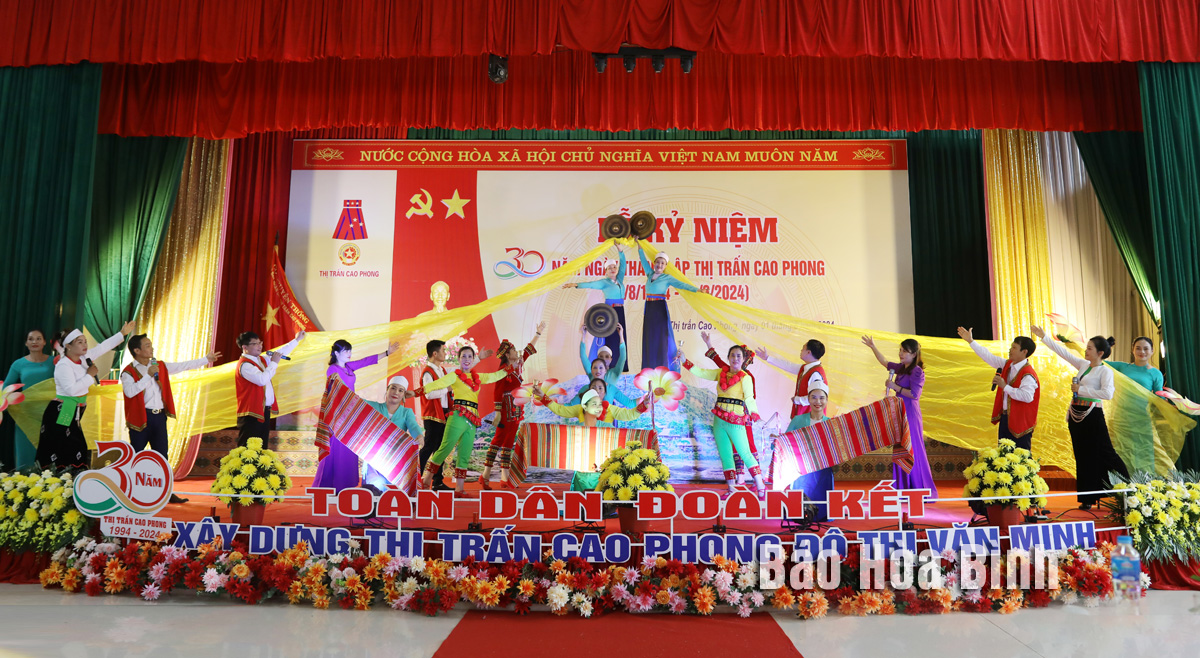
In recent years, Cao Phong district has focused on building and developing culture not only in daily life but also in politics and economics. This is one of six key tasks set in the resolutions of the 17th and 18th Party Congresses of the district, aiming to implement Resolution No. 33-NQ/TW of the 11th Party Central Committee on the development of Vietnamese culture and people to meet the nation’s sustainable development requirements.
Residents in Cao Phong town (Cao Phong
disstrict) proactively participate in cultural and artistic movements,
contributing to preserving and promoting the national culture.
Cultural development in tandem with sustainable
development
Vice Chairman of the People’s Committee of Cao
Phong district Nguyen Viet Phuong stated that recognising the key role of
culture in socio-economic development and in strengthening the political
system, Party committees and administrations at all levels in the district have
made the task of building a cultural environment a criterion for assessing the
performance of agencies and units.
Cultural development not only helps improve the
spiritual life of locals but also serves as an essential foundation for
completing sustainable development goals set by the district's Party
congresses.
The district focuses on political ideology,
ethics, and lifestyle education for cadres, party members, civil servants, and
public employees; promoting the role of those holding the top leading positions
in setting examples in implementing standards of conduct and professional
ethics.
Bui Dang Nhi, Secretary of the Party Committee
of Thach Yen commune, said the commune has promoted studyingand
following PresidentHo Chi Minh's
ideology,moralityandlifestyle, considering this a key task to
improve revolutionary ethics among cadres and party members. Over 90% of
households in the commune have achieved the title of "Cultural
Family", and 11 out of 12 hamlets of the commune have met cultural
standards.
Dinh Ba Cam, Director of the district’s Culture,
Sports and Tourism Centre, said the state management of culture in Cao Phong
district is deployed strictly and effectively. The district has created
favourable conditions for artists to maximise their creativity, and paid
attention to preserving and promoting the national cultural identity, he noted.
According to Cam, the district has 88 art
troupes in 88 hamlets and residential areas and 4 folk singing clubs. All
hamlets and residential areas have communal houses. The locality preserves over
1,600 gongs.
Motivation to promote socio-economic development
Cao Phong district pays heed to preserving the
cultural heritage, maintaining and promoting the national identity through
traditional festivals and historical-cultural relic sites.
In 2023, the district authority coordinated with
the provincial museum and related units to successfully organise the exhibition
"Hoa Binh's history from 1886 to 1975,”
attracting about 5.000 visitors in 7 days.
In addition, the district has implemented a plan
to preserve and promote Mo Muong cultural heritage through training activities,
seminars and cultural festivals. These activities attracted thousands of
visitors, contributing to promoting tourism and economic development of the
locality, creating momentum for socio-economic development.
Phuong said festivals and cultural activities
held annually have attracted a large number of tourists, generating significant
income for local residents. Traditional festivals not only help promote the
national culture, but also contribute to developing the tourism economy,
strengthening community solidarity and building a civilised society with
sustainable development.
The People’s Committee of Lac Son district held a ceremony on April 28 to receive the provincial relic certificate for the ancient rock carving site at Suoi Co stream, located in My Thanh commune.
A special music show titled "The country is in the fullness of joy” has been held at Hoa Binh Square in Hoa Binh city in celebration of the 50th anniversary of the liberation of the South and national reunification (April 30, 1975–2025).
The People's Committee of Lo Son commune, Tan Lac district, has organised the local annual traditional stream fishing festival on April 19 - 20.
As a land deeply intertwined with human history and Vietnam’s millennia-long journey of nation-building and defence, Hoa Binh is often revered for its epic tales and legends.
Residents of Hoa Binh boast a rich cultural identity, reflected in their unique language, traditional attire, customs, and folk melodies – described as "sweet as honey, clear as a mountain stream.”
Lac Son district’s Vu ban town held the 2025 Truong Kha temple festival on April 12–13 (the 15th–16th days of the third lunar month). Since its revival in 2019, the festival has been organised every three years, preserving valuable intangible heritage while meeting the community’s cultural and spiritual needs.



